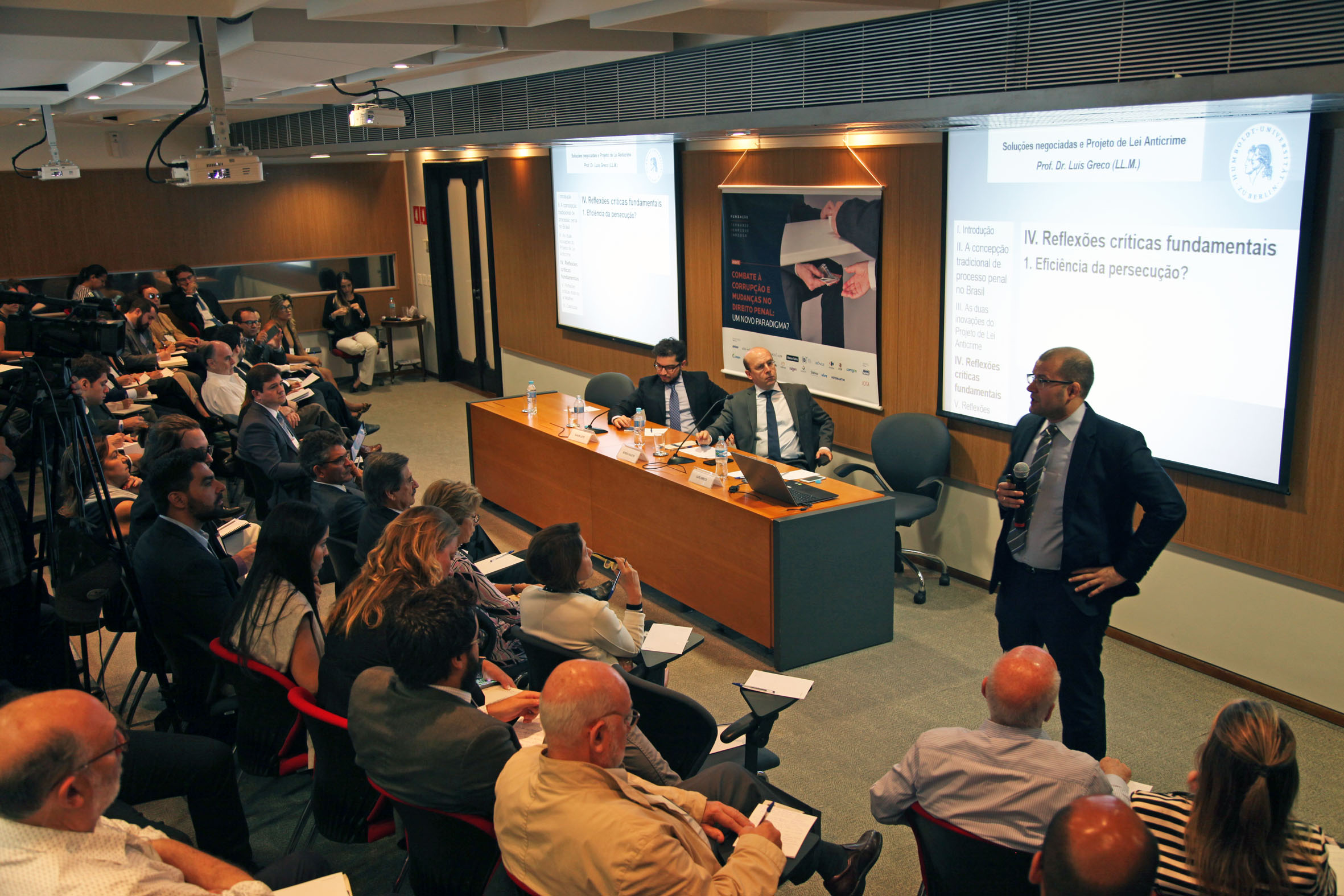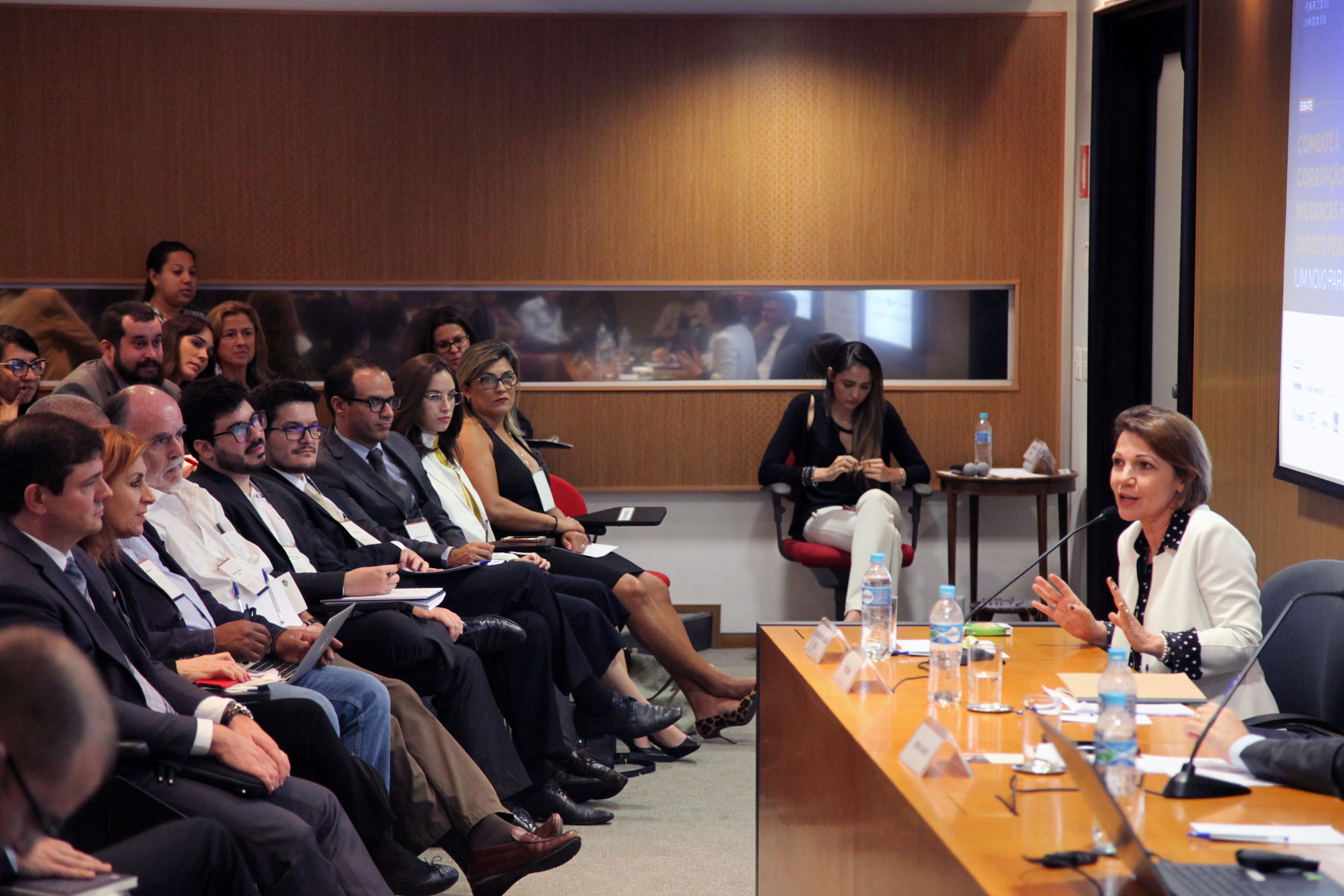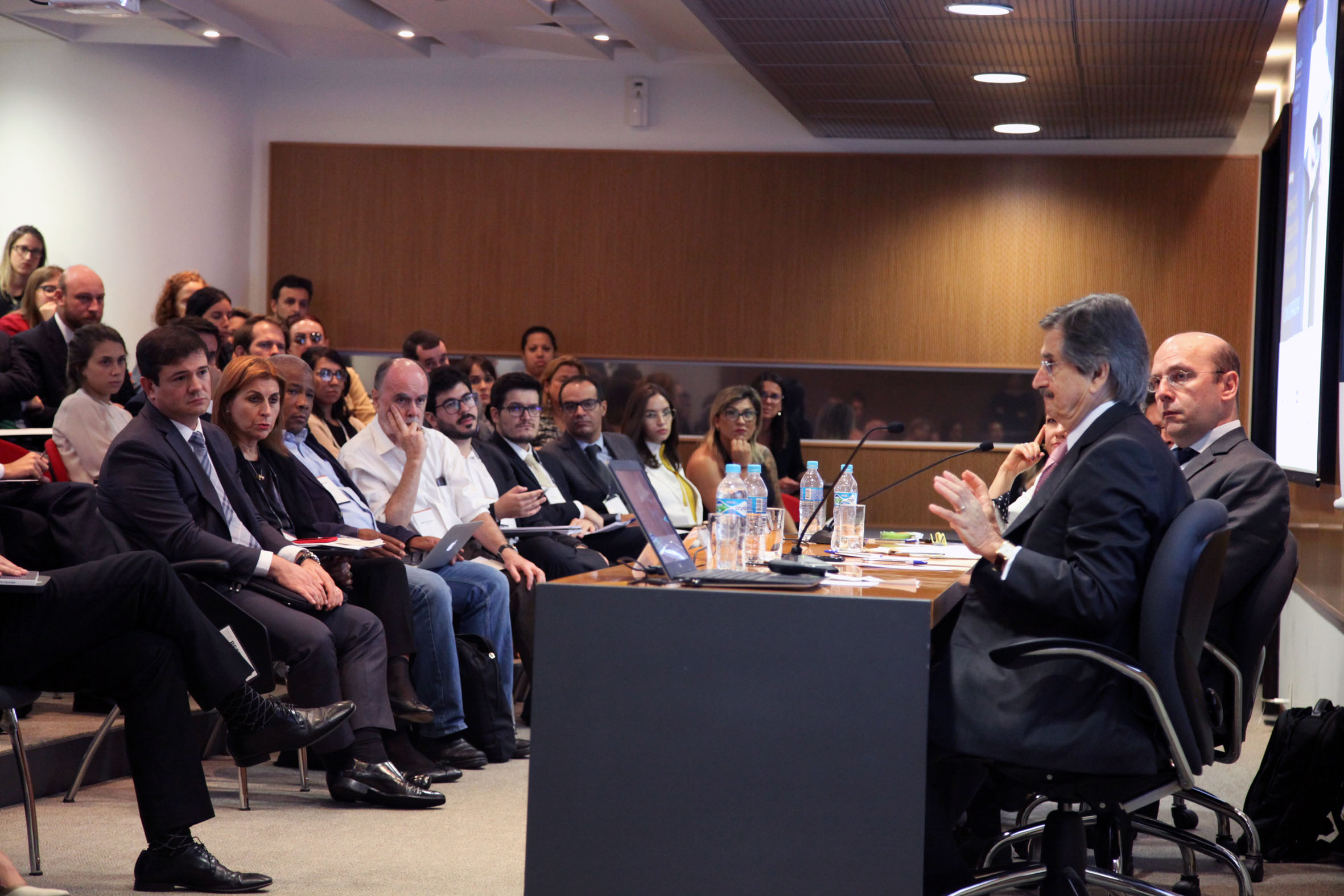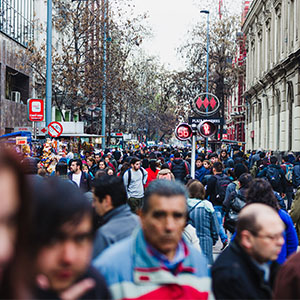In the last decades, Brazil has been very reactive towards successive corruption scandals, either by the Executive and Legislative branches proposing and passing new laws or by the Judiciary employing new interpretations and applications of existent legislation. However, the country is lacking a systemic view of how to deal with corruption, which includes not only its criminalization but, especially, its prevention.
This was the main conclusion reached at the conference "The Fight Against Corruption in Brazil and Changes in Criminal Law: A New Paradigm?", presented by a former Supreme Court Justice, a federal prosecutor, a criminal lawyer, and two Brazilian academics specialized in criminal law who reside in Germany. The event was cosponsored by the legal website JOTA.
"It bothers me that a position of conflict has been adopted at a moment like this. Virtually all those involved in criminal proceedings, whether prosecutors, lawyers or even judges, speak from their perspective, when it would be important to impartially identify issues and seek a common understanding. Legal scholars need to make an effort to demystify charlatanisms on the loose and build viable solutions," said Luís Greco, professor of Criminal Law at Humboldt University (Berlin).
"I want to defend the thesis that a fetish was recently created in Brazil about this topic. Since 1940 (when the decree that created the current Brazilian Penal Code was published), there has been no attempt to treat corruption more systemically, and what we have seen in recent decades is a regulatory flow that has resulted in legislative and legal chaos," said Alaor Leite, a doctorate in law from the Ludwig-Maximilian University (Munich) and scientific assistant to the chair of Criminal Law at Humboldt University.

Luis Greco and Alaor Leite, who stand out among the new generation of Brazilian criminal law scholars, residing for several years now in Germany, are co-authors of the "Proposta Alternativa para a Parte Geral do Código Penal Brasileiro" (Alternative Proposal for the General Part of the Brazilian Penal Code)" presented in 2017.
According to Theo Dias, a criminal lawyer who assisted the Fernando Henrique Cardoso Foundation in designing the conference, legislative reforms aimed at improving criminal law and criminal procedural law must be implemented. However, impunity in Brazil is primarily a management issue: "Criminal law is not applied as it should because the institutions of the penal system are slow, inefficient, bureaucratic, corporate or, in many cases, corrupt. It is necessary to deepen the debate regarding the reforms of the Judiciary, prosecution offices, and the police."
"We will only avoid a new ‘Operação Lava Jato’ (Operation Car Wash) ten years from now if we bring to the stage a character who has always succeeded in staying away from the debate – the political parties. In the name of the autonomy of structuring and internal functioning provided in the Constitution, they are opaque, without obligation to maintain internal democracy, transparency, and accountability," said Silvana Batini Cesar Góes, a federal prosecutor assigned to the Office of Federal Circuit Prosecution in Rio de Janeiro.
"The intensification of the fight against corruption deserves a round of applause, but it has perverse sides, such as the Judiciary's tendency to respond to the growing social demand for punishment. A judge must examine cases using only the existing evidence and often adopt counter-majoritarian positions, without worrying about their prestige with public opinion," said retired Supreme Court Justice Antonio Cezar Peluso, who presided the court between 2010 and 2012.
Specificities of political corruption
"The world trend is to sectorize corruption, looking at its specificities in areas such as health, sports, and politics, but Article 317 of the Brazilian Penal Code defines a comprehensive type of corruption, one that goes from the officer who doesn't issue a notice of violation to the politician who sells his vote or support to the government. This model is outdated and must be reviewed."
Alaor Leite, co-editor of the book "Crime e Política" (FGV-SP, 2017 - "Crime and Politics"), he is conducting postdoctoral research at Humboldt University under the guidance of Professor Luis Greco
The improvement of the fight against political corruption requires not only the creation of new, more specific and defined crimes, but also a better separation between different moments, such as campaign funding, electoral slush fund, and corruption itself (generally in the form of compensation paid by elected officials). "These three moments are considered one and the same in Brazil, but it is possible to distinguish them through more precise legislation," said Leite.
According to him, when interpreting such a wide range of crimes, the Judiciary is faced with the need to balance a "scale that is difficult to balance." "On the one hand, there is the risk of stating that there is corruption only when the subject trades an ex officio act, that is, a specific act that composes the set of attributions of the civil servants and public officials, such as the issue of a particular notice of violation or influence peddling of a specific indictment. However, this could result in the criminalization of only lower-level civil servants when the law should also be applied to politicians, including those at the top of the hierarchy," he said.
Leite explained that, in political corruption, what is marketed doesn't always assume the completeness of a concrete ex officio act, especially since the set of attributions of a politician is not as determined as that of other civil servants, "Can 'bringing people together', although not always with republican ends, or adhering to a certain 'thematic' caucus be considered ex officio acts?", he asked.
On the other hand, by making any relationship between political agents and private interests possible of being framed as a crime of corruption, "there is the risk of annihilating certain public activities, which would, therefore, result in the criminalization of politics."
Likewise, according to Alaor, judicial decisions considered ostensibly wrong for being in disagreement with the law should not be characterized as a crime of abuse of authority, as included in the bill "10 Measures against Corruption", proposed by the Federal Prosecution Service and presented to Congress by voter initiative in 2015 (which didn't pass). "Judges reacted saying that hermeneutics is essential to their work and the type of abuse of authority cannot annihilate a public function," he said.
Speaking at the opening of the event, Leite proposed a debate on other alternatives for dealing with political corruption, "Attempts to react in an isolated way to the scandals of recent decades (such as Collor, Mensalão, and Petrolão) did not allow us to discuss more effective and systemic solutions."
Sergio Moro's anti-corruption package
"Corruption has a collusive nature. In other crimes, how the State becomes aware of an offense is, in general, through the victim's report. However, in the case of corruption, everyone involved is in on the offense. Maybe we should review the traditional criminal prosecution, which begins with the so-called notitia criminis – knowledge of the commission of a crime, to see if it should be modified to deal with these crimes of collusive nature."
Luís Greco, Professor of Criminal Law, Criminal Procedure, Foreign Criminal Law and Theory of Criminal Law at the Humboldt University of Berlin
In his presentation, Luis Greco, Ph.D. (Ludwig-Maximilian University, Munich), commented on some of the innovations in the criminal procedure provided for in the Anti-Corruption and Anti-Crime Bill sent to Congress by Brazil's Minister of Justice, Sérgio Moro. They are basically two: an end to the principle of mandatory prosecution, which is replaced by the possibility of a deal between the parties, and the possibility of immediate imprisonment without the evidentiary stage of criminal prosecution.
The Professor at the Humboldt University explained that, in Brazil, the instances involved in criminal proceedings are not allowed to decide, on their account, in which cases they must or must not conduct criminal prosecution based on public interest or convenience criteria. "The main reason (to allow the decision not to prosecute) is based on the fact that there are no human and material resources to prosecute all known crimes – even if we wanted to. This is indeed a universal problem, known as the dark figure of crime," he said.
One of the articles in Sérgio Moro's bill (which will still be analyzed by representatives and senators) provides for the possibility of a non-prosecution agreement: the Public Prosecutor's Office could interpret the rule of mandatory criminal action as relative and, in exchange, offer a deal to the defendant (in the case of crimes punished with a maximum sentence of 4 years, non-violent crimes or crimes with no threat of immediate force, etc.).
The second measure, which would include the possibility of immediate sentencing, is considered by Professor Greco to be more controversial. "Some maintain that it would represent the effective introduction of plea bargain into Brazilian criminal law," he said.
The consensus among those involved is that, in this case, a stage that has always been considered essential for the production of evidence before the judge, which is when judges have the opportunity to rule on admissibility, is skipped. "The bill presented by Minister Sérgio Moro does not include an explanation of the reasons for these innovations. His argument seems to be that of efficiency in criminal action, especially in the case of collusive crimes such as corruption. Either the law is modified, or impunity will continue," he said.
However, according to Greco, the sentence is not legitimized only by efficiency. "No one wants an inefficient criminal law, but for a person to be sentenced, that person must be 'guilty.' Some foreign authors say that if the defendant agrees to waive the evidentiary stage, then he or she cannot complain because if there was consent, that means there was no injustice. However, I am not fully convinced of this argument because, in this situation, the defendant does not consent voluntarily – although I recognize that perfect voluntariness exists in few situations in life," he said.
For the professor, however, the most problematic aspect is the effect that the reduction of the sentence for the one who takes a plea bargain has over those who find inadmissible giving up their right to defend themselves, since the latter tends to receive an even harder sentence – since hardening the sentence to the maximum allowed by law, in case of non-acceptance of the deal proposed by the prosecution, is part of the bargaining logic of the plea bargain. According to Greco, what legitimates the sentence is not the defendant agreeing with it, but the fact that it is proportional to the severity of the crime committed, "When a sentence is imposed for something that the person did not do, we have a lie, and the State cannot lie."
The speaker also made reservations to the possibility of a deal for plea bargain imprisonment. "Imprisonment is, in fact, a real sentence. One cannot arrest someone without presenting an unequivocal truth that legitimizes the arrest," he explained.
Although more than 90 percent of the US lawsuits are resolved through a plea bargain, Greco is reticent about its use in Brazil. "There are many differences between the US and Brazilian criminal proceedings, and I don't think the American case works well in terms of guaranteeing justice is done and only the guilty are punished. Borrowing something that sounds good in a foreign language does not help improve our system," he said.
Faced with the question of what must then be done to make criminal proceedings more effective in Brazil, Greco proposed more dialogue among the various operators of the Law. 'One must begin a conversation with the intention of understanding and approaching the other's position. The Prosecution Office must admit that it is a body that needs more control, the defense lawyer must accept that a proceeding that leads nowhere is not good either. We should not fall into either excess of guarantee or bear-minimum criminal law," he concluded.
The decision to send electoral slush fund to Electoral Justice was ‘hard to accept’
"I have been a public prosecutor for 26 years, and I have never felt out of control. As a prosecutor, I ask for sentencing, search and seizure, prison, but the final decision rests with the judge. Therefore, the Public Prosecution Office is an institution that is constrained by this institutional design."
Silvana Batini Cesar Góes, a Federal Circuit Prosecutor of the state of Rio de Janeiro and professor of the Rio de Janeiro Law School - Getúlio Vargas Foundation

Silvana Góes, who is part of the Operation Car Wash team in Rio, agreed with the thesis that Brazil has adopted a mainly reactive agenda in criminal law but stressed that this position is not restricted to the fight against corruption. "One example is the lack of planning in terms of criminal policy. We are always reacting to scandals and crises. Also, that results in sacrifices to the system as a whole," she said.
The prosecutor commented on a recent decision by the Supreme Court to send cases of corruption involving slush fund and irregular financing of campaigns to the Electoral Justice. "How long have we been slipping without adequate legislation to properly characterize the crime of corruption?" she asked. "Also, think of electoral and party legislation in Brazil, the irregular financing of campaigns and slush fund - which is, in fact, an ideological falsehood."
Silvana recalled that, since the criminal action against former President Collor (1992), the defense strategy is to say that the resources under suspicion are campaign leftovers. More than a decade later, politicians involved in the Mensalão argued that the illegal resources they had received were intended to pay campaign expenses.
"There is no doubt that since the beginning of the 1990s the strategy of political actors is to pretend corruption never took place by placing it under the umbrella of irregular campaign funding as if it were a socially and politically accepted conduct. Former President Lula tried to justify his party's conduct with the 'everybody does what we did' argument, " she said.
According to the Professor at Fundação Getulio Vargas’ Law School, the Electoral Justice is no better or worse than the common one, but it is not adequate to act in the jurisdictional area, "Its primary attribution is to organize and supervise the electoral processes, so they are clean, fair, transparent and effective, and it has done so very well. However, in judging cases of impeachment, for example, it faces the same slowness that is characteristic of other proceedings."
Silvana reacted to the statement of Luís Greco, who said that the National Council of Prosecution Services tried to legislate by defining rules for non-prosecution. According to him, the Prosecution's Office highest body intended "to give external effects to an interna corporis decision."
“What the National Council of the Prosecution Services sought was to bring some homogeneity and rationality to how prosecutors work in this huge and diverse country that is Brazil. I believe that institutions must have a policy that guides their members, and what happened before was that each member of the Federal Prosecution Service decided alone, at their offices, which case to take to court or not,” she explained.
"When a prosecutor decides to file a criminal action, albeit mistakenly, he or she brings up the allegations in question and triggers the existing control mechanisms. However, when you choose not to act, then the effect can be more negative because nothing happens. Hence the importance of the National Council's resolution in 2017," she said.
The speaker defended the review of the system of appeals in force in the country, “Today we have a complex network of appeal channels intertwined in several instances, and we only recognize a sentence as legal truth when it is confirmed by the Supreme Court. Wouldn't it be the case to build this truth in a more consistent and less utopian way in the course of the proceeding?”
“The Supreme Court needs to be relieved of its various other functions and focus on ensuring compliance with the Constitution,” said Silvana, who also criticized the Supreme Court’s recent decision to investigate verbal attacks on the court. "So now the Supreme Court will investigate and produce evidence? I hereby invoke my right to freedom of expression so that I do not become the target of a secret inquiry because of what I just said."
‘Criminal Law inflation’
“The Operation Lava Jato investigations reveal the porous borders between slush fund and corruption. When does an election donation correspond to bribe? Operation Car Wash uncovered examples of acts of corruption both through official election donations and unofficial donations without evidence of compensations.”
Theo Dias, is a criminal lawyer and holds a Doctor’s Degree in Law from the University of Saarland (Germany)
Theo Dias, a professor at São Paulo Law School – FGV, recalled that people's pressure for greater criminal rigor is not exclusive to Brazil: "In several Western democracies, the criminal justice system is experiencing a process of regulatory expansion, punitive escalation, and increase of diversification of investigative means. Criminal law has become the great wild card of contemporary politics. It is easier to increase the punishment of the crime of corruption than to review the electoral financing system or the tax system. It is imperative that we discuss the rationality of this unrestricted social trust in the sentence as a lifeline for all evils."
Dias proposed legal and institutional reforms of a non-criminal law nature aimed at ensuring a business environment less conducive to corruption, such as measures to ensure greater transparency in tender procedures, fight against over-regulation and bureaucratic obstacles, strengthening a culture of governance and compliance in public and private companies, and more effective accountability of companies and their leaders.
The lawyer stated that he is in favor of plea-bargain collaboration. "International experience teaches us that this tool, if well-used, can reveal and prevent crimes, provide economic reimbursement to the State, secure sentences, and pave the way for economic recovery and ethical transformation of companies. It is, moreover, a defense tool of the defendant, who chooses to confess and reveal his or her principals," he said.
He warned, however, that there is a risk of turning this method of investigation “commonplace”: "The state should not become dependent on confession due to willingness to investigate. It is up to the Public Prosecution's Office and the Judiciary to assess, on a case-by-case basis, the need and public interest of plea bargains. There are examples in both directions within Operation Car Wash. There were good plea bargains that contributed to the disclosure and prevention of crimes as well as reimbursement of damages to the State, and there were bad ones, made in a hurry and without much criteria."
According to Dias, Brazil is only taking the first steps in building an efficient system for negotiating plea bargains with individuals and leniency deals with companies. "What we see today are several institutions competing for prominence, which is a factor of legal insecurity. Some of these institutions are related to the Executive Power and may not be interested in disclosing illegal conduct by its members. It is a Kafkaesque scenario in which a company makes a deal with a public body but cannot recover financially because it becomes more vulnerable and subject to state retaliation," he said.
'Judicial Messianism'
"The law is not neutral, but must be impartial. As a judge, I have always been open to forming my opinions without pre-judgments. The defendant has the right to be tried by someone he or she considers impartial."
Antonio Cezar Peluso, retired Supreme Court Justice (2003 to 2012)

Antonio Cezar Peluso, who served in the Judiciary branch for 44 years and presided over the Supreme Court from 2010 to 2012, criticized judges who feel they have a "divine mandate to change the country's culture, sometimes to the detriment of fundamental respect for the legal order." "It is not up to the Judiciary branch to make revolutions, but to protect citizens from the arbitrariness of the state," he said.
"When we convince ourselves that we have a mission to fulfill, we act with passion and emotion and not with reason," he added. He then quoted two cases in which, in his view, the Supreme Court tried to be a spokesperson for the streets instead of acting as guarantor of the Constitution.
The first was when the Supreme Court decided to apply the Clean Record Act to convicted politicians before the law came into force. "How is that possible? No one can be liable under a law which did not exist at the time of the commission of the crime against which he or she is accused of. Why did that happen? Simply because civic consciousness so demanded," he said.
The second case was the Supreme Court session that authorized the service of a sentence of imprisonment after a second instance decision. "By one vote, the Justices of the Supreme Court ‘revoked’ the constitutional clause that determines that no one will be found guilty until res judicata. It was a typical case of decision motivated by the intention to respond to a desire of society," he said.
"I have no doubt that the appeal system in force in Brazil is bad and that it is repulsive that some cases fall under limitation because they have not been analyzed in time by all existing judicial instances. But to change that, we must amend the Constitution," said the Justice who, in 2011, when he was president of the Supreme Court, presented to Congress the so-called 'PEC dos Recursos' (constitutional amendment proposal for new appellate rules), with the objective of reducing the number of appeals to the Supreme Court and the Superior Court of Justice, and giving more agility to judicial decisions.
Finally, he also commented on a recent session of the Supreme Court that discussed the possibility of criminalization of homophobia (which is still pending a decision). "Homophobia is abominable, but it is not possible to criminalize it by analogy to the crime of racism, which is a crime already set by law. If we want to make homophobia a crime, the legislature will have to analyze the issue and vote," he said.
Otávio Dias is a journalist specialized in politics and international affairs, former correspondent of Folha de S. Paulo in London, and editor of the website estadao.com.br. He is currently the content editor at the Fernando Henrique Cardoso Foundation.
Portuguese to English translation by Melissa Harkin (Harkin Translations).









